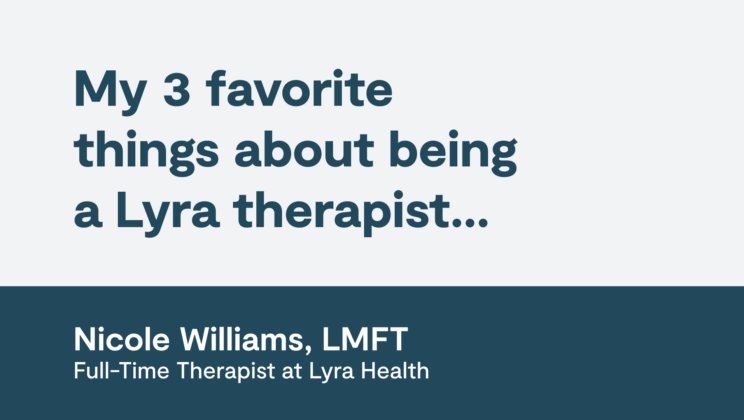It’s Not Rocket Science: A Great Environment Supports Providing Great Care
July 8, 2022
Soon after I was first licensed, I found myself in an interview with a man named Fred. Fred was the director of a local family service organization and had been a clinician for many years. As we discussed our perspectives on what it means to practice good therapy, he shared one of his core beliefs: Therapeutic change is essentially the result of simply having a presence in the room.
I was adamant that there was more to therapy than just having a beating heart and establishing rapport—theory and structure had to count for something. And after more than twenty years of direct clinical practice, I have come to know that it is, in fact, a balance of both relationship and theory that makes for the most powerful and positive of therapeutic changes.
I joined Lyra in 2021, and have been truly impressed by their understanding and expectation around empirically supported practice, while also encouraging a deeper understanding of the relationship with self, the client, and the world that impacts us all. I feel compelled to organize my thoughts so that other clinicians can decide if the unique and somewhat revolutionary experience Lyra offers for providers and clients could be a good fit for their own careers.
Being the best (and knowing when you’re not)
In the book Good to Great, Jim Collins writes about three primary ingredients for a “great” company. They are:
- Determine what you can and cannot be the best in the world at
- Determine what drives your economic engine
- Determine what you are deeply passionate about
In my experience, Lyra has covered all of these bases.
Since graduate school, my work experiences have included education, training, and clinical support for active-duty Navy personnel; sexual assault forensic collection and counseling; sexual assault crisis intervention and support; parenting groups/classes; hospital social work; and, since 2001, private practice.
I first heard of Lyra in an online training. Upon researching the company, I immediately recognized Lyra as a company that knew what they were looking for in their providers and had the discipline to insist upon a high standard. I was also impressed by the amazing EAP benefits they offered and applied to become a contract therapist.
I’d had plenty of experiences with EAPs in the past and knew to be cautious. Often, accessing a benefit required a lot of paperwork for limited or short-term access. Lyra’s benefits were the most robust that I had ever seen.
I applied to become a full-time, employed therapist with Lyra Care Therapy program in July 2021. Lyra Care has been a satisfying and unique experience in providing therapy. It brings an expectation of structure, purpose, accountability, and relationship that I have always believed to be important foundations for mental health and positive change.
Since becoming a Lyra Care Therapist, my manager has challenged and guided me in areas such as a more specific use of Socratic Questioning, making my notes increasingly specific and measurable, and looking for a client’s core beliefs—all while fully trusting and respecting my therapeutic expertise. These components and more set the tone around knowing what makes me great, learning where there is more, and pushing myself to become greater. Lyra encourages me to always be curious and always be learning.
Focusing on evidence-based care
Jim Collins also notes that an exceptional company rests on a foundation of disciplined thought, people, and actions. Lyra’s focus on the use of Cognitive Behavioral Therapy (CBT) speaks to the discipline of thought and action that is the underpinning of its success.
It’s no secret that CBT is one of the most empirically supported models for successful therapeutic outcomes. More than two thousand studies have been conducted on CBT, with research showing that it helps people get better and stay better. CBT brings increased agency over one’s own emotional landscape.
According to the book Cognitive Behavior Therapy: Basics and Beyond, CBT is steeped in 14 tenets, including:
- CBT treatment plans are based on an ever-evolving cognitive conceptualization.
- CBT requires a sound therapeutic relationship.
- CBT continually monitors client progress.
- CBT is culturally adapted and tailors treatment to the individual.
- CBT emphasizes the positive.
- CBT stresses collaboration and active participation.
- CBT is aspirational, values-based, and goal-oriented.
- CBT initially emphasizes the present.
- CBT is educative.
- CBT is time-sensitive.
- CBT sessions are structured.
- CBT uses guided discovery and teaches clients to respond to their dysfunctional cognitions.
- CBT includes action plans (therapy homework).
- CBT uses a variety of techniques to change thinking, mood, and behavior.
As I noted, this is profoundly important in changing lives for the better. In working with Lyra, I can attest to the expectation and support provided to all therapists in maintaining these tenets.
The economic engine
If I were to acknowledge one of the more challenging aspects of running my own clinical practice, it would be to note that my degree is in social work, not business. Having managed my own practice for the last 10 years and as an employee with numerous organizations, I know that making a living by supporting the mental health of others requires a certain balance. There are aspects that can feel muddy in the contrast between therapeutic relationships and the financial restraints of access, insurance, availability, etc. Lyra has oriented its economic engine with the empirical understanding that CBT works, and rewards clinicians who work to increase efficacy through learning, practice, and creativity. Additionally, they place a huge emphasis on the emotional, professional, and financial health of their employees.
Passion
Access to therapy can be limited to people for a number of reasons including lack of insurance, high costs, a lack of available care nearby, and barriers based on race, religion, gender, or sexual orientation. My passion and Lyra’s intersect around access for everyone. In my community, it’s not even possible for clients to access therapy within a few months, much less a few days or weeks. Lyra’s insistence on timely and culturally responsive access to care for everyone is revolutionary and is the core reason that I joined their Blended Care team.
Finally, I believe Lyra’s culture rests on a passion for helping people. Brené Brown talks of engaged feedback in the book Daring Greatly, I am struck by how many of these aspects are part of the Lyra culture:
- I’m ready to sit next to you rather than across from you.
- I’m willing to put the problem in front of us rather than between us (or slide it toward you).
- I’m ready to listen, ask questions, and accept that I may not fully understand the issue.
- I’m ready to acknowledge what you do well instead of picking apart your mistakes.
- I recognize your strengths and how you can use them to address your challenges.
- I can hold you accountable without shaming or blaming you.
- I am open to owning my part.
- I can genuinely thank someone for their efforts rather than criticize them for their failings.
- I can talk about how resolving these challenges will lead to growth and opportunity.
- can model the vulnerability and openness that I expect to see from you.
Doing great in a great company
I live and work in Virginia. Very recently, I wore a Lyra t-shirt while running with a friend in Arizona. Another runner began to pass me and shouted excitedly, “Lyra! Hey, Lyra! I work for Lyra too!” I yelled my own enthusiastic response, clapping my own hands. This single interaction illustrates the positive and hopeful culture of Lyra. Lyra is passionate about what they do and strives to create a collective culture that is challenging, safe, supportive, and just.
Changing or accepting new jobs is stressful and uncertain. One never knows if the expectations or the culture will be a good fit. If you are interested in being part of a great company, with great people, and doing great work, you may want to consider Lyra.
CONTACT US
If you want help connecting with a coach or therapist, Lyra can assist you. You can get started today if Lyra is offered by your employer. Sign up now.
For employers who want to learn more about the value and impact of a mental health benefit, download our white paper or get in touch.
And check in frequently here or follow us on Facebook, LinkedIn, and Twitter for more insights into supporting employees’ mental health.
Explore additional blogs

Working at Lyra
Becoming a Lyra Therapist: Making the Most of Your Interview

Working at Lyra
My Favorite Things About Working With Lyra

Working at Lyra